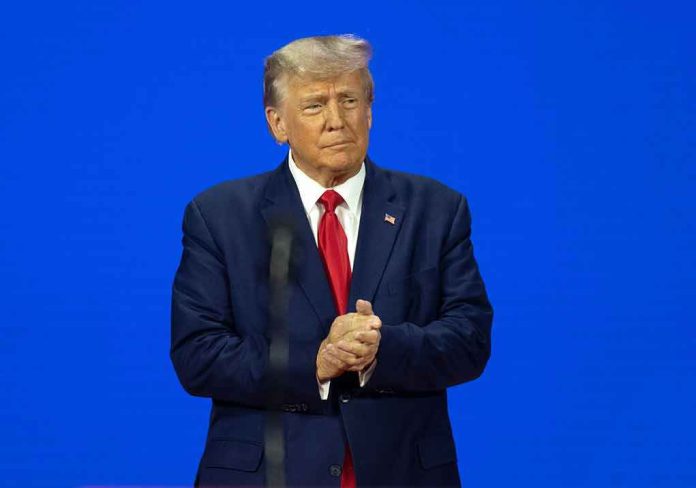
In a move hailed by many conservatives as a long-overdue defense of American values, the notorious Antifa propaganda website “It’s Going Down” has abruptly shut down following President Trump’s executive order designating Antifa a domestic terrorist organization.
Story Snapshot
- President Trump’s executive order has led to the formal designation of Antifa as a domestic terrorist organization.
- Federal crackdowns have forced the shutdown of Antifa’s prominent online propaganda hub, “It’s Going Down.”
- The crackdown has sparked heated debates over free speech, government power, and constitutional protections.
- Legal experts, activists, and law enforcement are now locked in a high-stakes standoff over the definition and enforcement of domestic terrorism laws.
Trump’s Executive Order Hits Antifa’s Online Operations
On September 22, 2025, President Trump signed an executive order officially designating Antifa as a domestic terrorist organization, fulfilling a campaign promise to restore law and order amid years of unrest and leftist violence. The decision followed Trump’s public announcement days earlier, where he cited the need to dismantle what he described as “major terrorist organizations” undermining American communities. This unprecedented move immediately triggered a wave of federal investigations and enforcement actions against individuals and groups linked to Antifa, with the most visible impact being the sudden shutdown of “It’s Going Down,” a website long recognized for spreading radical leftist propaganda and promoting anarchist activity.
Federal agencies, including the FBI and Department of Homeland Security, wasted no time launching coordinated efforts to disrupt Antifa’s operations. Investigations quickly expanded into the movement’s funding sources and digital networks, targeting those who facilitated or supported activities labeled as domestic extremism. The result was a rapid chilling effect across left-wing activist communities, as groups scrambled to distance themselves from the newly designated terrorist label. “It’s Going Down” cited a “dire” threat environment as it announced its closure, indicating that the federal crackdown had achieved its intended goal of disrupting Antifa’s online organizing and propaganda machine. For many Americans frustrated by years of unchecked lawlessness, the swift action provided a sense of long-awaited justice and a clear message that criminal activism would no longer be tolerated.
Legal Battles and the Constitutionality Debate
The Trump administration’s aggressive stance has not gone unchallenged. Legal scholars and civil liberties organizations immediately questioned whether the president has the authority to designate domestic groups as terrorist organizations, citing potential violations of the First Amendment and overreach of executive power. Critics argue that Antifa, as a loosely organized movement rather than a formal group, complicates enforcement and raises serious constitutional concerns. Despite these objections, administration officials—backed by the support of conservative lawmakers and a significant segment of the public—maintain that the executive order is both necessary and justified to combat what they characterize as escalating domestic threats. This ongoing legal battle highlights the tensions between security and liberty, with the courts expected to play a pivotal role in determining the lasting impact of the administration’s actions.
Experts note that previous attempts to label Antifa as a terrorist organization faced significant constitutional hurdles, with courts historically resisting federal overreach into domestic political activism. However, the current political climate, shaped by widespread frustration over perceived liberal excesses and urban unrest, has shifted the boundaries of what is considered acceptable government intervention. For Trump supporters and advocates of strong national defense, the crackdown is a clear victory against those who have long sought to undermine American traditions, law enforcement, and the rule of law.
Impact on Activism and Free Speech
The immediate fallout from the executive order has sent shockwaves through activist networks nationwide. Antifa-affiliated groups report increased fear of prosecution, while left-wing online platforms face heightened scrutiny or outright removal. Law enforcement agencies now possess expanded justification to investigate, detain, and prosecute individuals associated with radical activism, raising concerns about possible abuse or misapplication of terrorism laws. Meanwhile, the closure of “It’s Going Down” is widely seen as a significant blow to Antifa’s ability to coordinate and amplify its message, further isolating extremist elements from mainstream discourse.
Beyond the legal and operational consequences, the shutdown has ignited a broader debate over the boundaries of free speech and government authority. While some experts warn of potential First Amendment violations, many on the right contend that public safety and the preservation of order must take precedence over platforms that openly advocate violence or lawlessness. This development marks a turning point in America’s approach to domestic extremism, as the Trump administration leverages federal power to challenge groups and ideologies viewed as threats to national stability and conservative values.
Broader Implications and the Road Ahead
The precedent set by the executive order and subsequent enforcement actions may reshape the landscape for activist movements in the United States for years to come. Tech companies could face new pressure to monitor or remove content linked to radical left-wing ideologies, while legal challenges will test the limits of executive authority in the realm of domestic security. For communities that endured years of protest-related violence and property damage, the crackdown offers hope that law and order will finally be restored. However, the ongoing debates over constitutional rights and the role of government indicate that the fight over America’s political future is far from over.
As the dust settles from these landmark decisions, Americans across the political spectrum are left to grapple with the implications for free expression, public safety, and the enduring battle to define the nation’s core values. The fate of Antifa’s online presence serves as a potent reminder that, in today’s polarized climate, decisive action can have both immediate victories and long-term consequences for the country’s direction.
Sources:
Antifa (United States) – Wikipedia
Antifa Propaganda Site Goes Offline Following Trump Crackdown – Daily Caller
Designating Antifa as a Domestic Terrorist Organization – Federal Register
Portland Fake News Ignores Antifa Violence, Residents’ Pleas for Help – The White House





